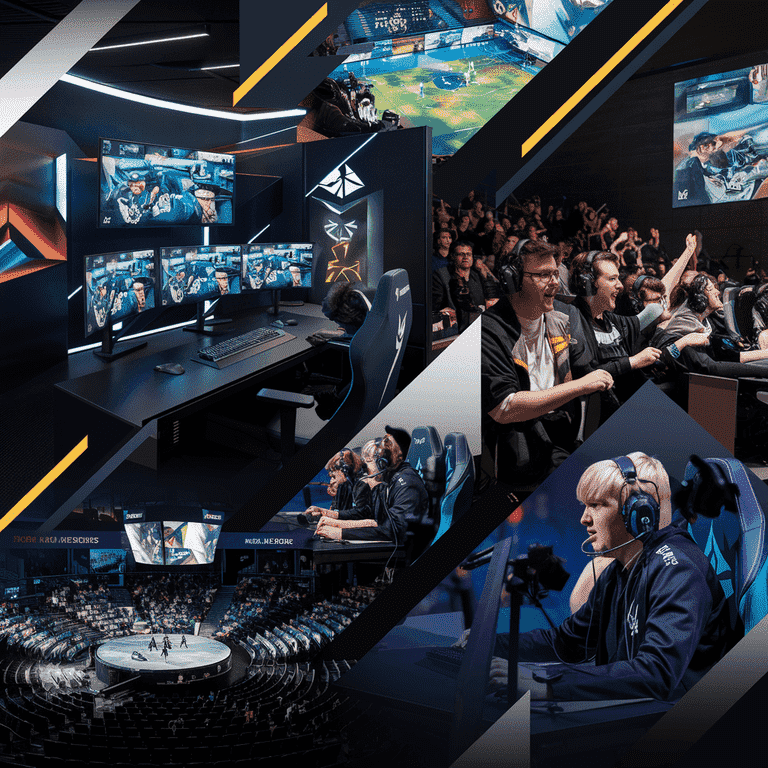Esports has transformed from a niche hobby into a global phenomenon. Once seen as casual gaming, it’s now a booming industry where professional players compete in high-stakes tournaments. With its rapid growth, esports has attracted the attention of fans, investors, and lawmakers alike.
Nevada, known for its vibrant entertainment and gambling scene, plays a unique role in this industry. The state’s regulations, designed with traditional gambling in mind, now intersect with the world of competitive gaming. Understanding these legal implications is crucial for everyone involved, from players to organizers and investors.
What is Esports?
Esports, or electronic sports, refers to competitive video gaming where individuals or teams compete against each other, often in front of live audiences and millions of online viewers.
Types of Games in Esports
Esports includes various genres that appeal to different kinds of players and fans:
- First-Person Shooters (FPS): Games like Counter-Strike: Global Offensive (CS
- ) and Call of Duty, focusing on tactical gameplay and quick reflexes.
- Multiplayer Online Battle Arenas (MOBA): Popular games like League of Legends and Dota 2, known for their strategic depth and team coordination.
- Real-Time Strategy (RTS): Games like StarCraft II require strategic planning and fast decision-making.
- Sports Simulations: Titles like FIFA and NBA 2K simulate real-world sports, allowing players to control teams and athletes in virtual arenas.
Critical Differences Between Esports and Traditional Sports
Esports and traditional sports share similarities, such as competition and fan engagement, but there are key differences:
- Physical vs. Digital Skills: Traditional sports rely on physical skills, while esports focuses on mental agility, reaction times, and strategic thinking.
- Audience Engagement: Esports events are accessible globally through online streaming platforms, allowing fans to connect directly with their favorite players and teams, unlike traditional sports that often require in-person attendance or TV access.

The Esports Ecosystem
Esports is not just about the players—it’s a complex ecosystem with multiple stakeholders, each playing a crucial role in the industry’s growth.
Key Players in the Esports Industry
- Professional Teams and Players: The core of esports, featuring star players and teams that compete in major tournaments.
- Tournament Organizers: Companies like ESL and DreamHack that organize large-scale events, often with substantial prize pools.
- Game Publishers: Developers like Riot Games and Blizzard Entertainment who create the games and control their competitive scenes.
- Streaming Platforms: Platforms like Twitch and YouTube Gaming that broadcast events live, allowing fans to watch their favorite players in action.
The Rise of Esports Tournaments and Leagues
Tournaments are the lifeblood of esports, drawing fans and generating buzz with high-stakes competition.
Popular Esports Leagues and Tournaments
- The International (Dota 2): Known for its massive prize pools funded by fans through in-game purchases.
- League of Legends World Championship: One of the most-watched esports events, with millions tuning in each year.
- Call of Duty League: A franchised league with city-based teams, similar to traditional sports leagues.
- Overwatch League: Another franchised league that has helped bridge the gap between esports and mainstream sports.
Growth of Collegiate and Amateur Esports
- University Programs and Scholarships: Colleges are increasingly offering scholarships for esports athletes, recognizing the industry’s growing importance.
- Amateur Circuits and Grassroots Competitions: Beyond professional play, there are numerous opportunities for amateurs to compete and hone their skills, helping to feed talent into the pro scene.

The Impact of Streaming and Social Media on Esports
Esports owes much of its explosive growth to streaming and social media. These platforms have turned what was once a niche pastime into a globally recognized sport, allowing fans to watch live matches, follow their favorite players, and interact in real-time.
Role of Streaming Platforms
Streaming platforms are the heart of esports. They provide a space where fans can watch games live, interact with players, and feel like part of the action.
- Twitch: The most popular platform, Twitch has millions of viewers tuning in daily to watch esports tournaments, player streams, and gaming talk shows.
- YouTube Gaming: Another major player, YouTube offers both live streams and video-on-demand content, allowing fans to catch up on matches they missed.
- Emerging Platforms: Newer platforms like Facebook Gaming and Trovo also join the scene, offering unique features and trying to carve out their audiences.
Streaming isn’t just about watching games—it’s about connecting with the community. Viewers can chat live with other fans, send messages directly to players, and even donate to support their favorite streamers. This level of engagement sets esports apart from traditional sports.
Social Media Influence on Esports
Social media has amplified esports’ reach, creating a direct line between players, teams, and fans. It’s not just about game updates; it’s about building a brand and engaging with the community.
- Building Player and Team Brands: Players and teams use platforms like Twitter, Instagram, and TikTok to share their lives beyond the game. This behind-the-scenes content helps fans feel closer to their idols.
- Fan Engagement: Social media contests, Q&As, and live updates keep fans engaged and invested. Teams often use social media to announce roster changes, match results, and upcoming events.
- Memes and Viral Moments: Esports culture thrives on memes, highlights, and viral moments. These snippets spread quickly, drawing in new fans and keeping the community buzzing.
Esports and Gambling: A Legal Perspective
Esports and gambling have a complicated relationship. As the esports industry grows, so does the interest in betting on matches and players. But this intersection raises legal and ethical questions, especially in a state like Nevada, known for its stringent gambling laws.
Overview of Gambling in Esports
Betting on esports has become increasingly popular, with fans wagering on match outcomes, individual performances, and even in-game events.
- Betting on Esports Matches: Fans can place bets on major tournaments and even smaller amateur matches. This mirrors traditional sports betting, but it has its own unique set of challenges and opportunities.
- The Rise of Skin Gambling: Some players bet in-game items or “skins” as currency. This unregulated market has faced criticism for its potential to target younger audiences and lead to gambling addiction.
Regulatory Challenges
Navigating the legal landscape of esports gambling isn’t straightforward. Different regions have varying regulations, and not all gambling formats are legal everywhere.
- Differences in Gambling Regulations Globally: While some countries embrace esports betting, others have strict bans. This inconsistency creates a complex environment for betting companies and fans alike.
- Steps Taken to Regulate Esports Gambling: In Nevada, regulators are starting to address esports betting, aiming to protect consumers while allowing the industry to thrive. This includes setting age restrictions, ensuring fair play, and combating match-fixing.
Esports gambling will continue to grow, but it must do so responsibly. Striking the right balance between opportunity and regulation is crucial for the future of both industries.

The Future of Esports
Esports isn’t just here to stay—it’s evolving. With new technologies on the horizon, the future looks bright and full of possibilities.
Technological Innovations Shaping Esports
Esports is driven by technology, and innovations continually push the boundaries of what’s possible.
- Virtual Reality (VR) and Augmented Reality (AR): These technologies promise to make games even more immersive, allowing players and fans to experience matches in new ways.
- AI and Analytics in Gameplay Improvement: Advanced AI tools analyze gameplay, helping players refine their strategies and improve performance.
Predictions for the Future Growth of Esports
The future of esports isn’t just about bigger tournaments and higher prize pools—it’s about mainstream acceptance and integration.
- Expansion into Mainstream Media: We’re already seeing esports on major sports networks and news outlets. This trend will likely continue, bridging the gap between traditional sports and esports.
- Increased Investment from Traditional Sports Entities: Many traditional sports teams and investors are investing in esports, recognizing its potential for growth and fan engagement.
Esports is more than just games—it’s a cultural movement. It will reshape how we think about sports, entertainment, and competition as it continues to grow.

Breaking It All Down
Esports is redefining what it means to be a sport in the digital age. From its complex ecosystem to its legal challenges and future potential, understanding esports is critical for fans, players, and businesses. With its unique blend of entertainment and gambling laws, Nevada stands at the forefront of this exciting evolution.

Frequently Asked Questions
What makes esports different from traditional sports?
Esports differs from traditional sports primarily in its digital nature. While conventional sports require physical athleticism, esports emphasizes mental agility, quick reflexes, and strategic thinking. It’s also more accessible since fans can watch live streams from anywhere worldwide without attending in person.
How do professional esports players make money?
Professional esports players earn money through multiple channels, including tournament prize money, sponsorship deals, streaming revenue, and team salaries. Top players can earn additional income from merchandise sales and personal brand endorsements.
What are some popular games in esports?
Popular games in esports include titles across various genres. Notable examples include League of Legends and Dota 2 (MOBA), Counter-Strike: Global Offensive (FPS), StarCraft II (RTS), and FIFA (sports simulation). Each game has its own dedicated fanbase and professional scene.
How do esports tournaments work?
Esports tournaments typically feature professional teams or players competing in organized brackets, often culminating in a grand final. Tournaments can be single-elimination, double-elimination, or round-robin formats, and they usually involve large prize pools funded by sponsors, entry fees, or in-game purchases.
Are there any age restrictions for watching or participating in esports?
Age restrictions in esports can vary depending on the game and the tournament. Most professional tournaments have minimum age requirements, usually around 16-18 years old. For viewers, restrictions might apply for certain games with mature content, but generally, anyone can watch.
How do esports teams recruit new players?
Esports teams scout new talent through online rankings, amateur tournaments, and social media platforms. Aspiring players can also gain exposure by streaming on platforms like Twitch or participating in collegiate esports programs, which are increasingly becoming a pipeline to the professional level.
Is esports gambling legal in Nevada?
Esports gambling is legal in Nevada but is regulated by state laws to ensure fair play and consumer protection. Betting on esports events is subject to the same rules as traditional sports betting, and operators must comply with licensing requirements set by the Nevada Gaming Commission.
What are some common concerns about esports gambling?
Concerns about esports gambling include the potential for underage betting, match-fixing, and the rise of unregulated markets like skin gambling. Regions are implementing age restrictions, anti-fraud measures, and stricter oversight to address these issues to maintain integrity in esports betting.

Additional Resources for You from The Rosenblum Allen Law Firm.
As a reminder, our lead attorney, Molly Rosenblum Allen, Esq., has created several valuable resources to assist you in your time of need, especially if you are dealing with legal issues related to gambling in Nevada. These resources cover a range of topics that can help guide you through complex legal matters:
Underage Gambling: Understanding the laws and consequences surrounding underage gambling offenses in Nevada.
Gambling Debt Collection Crimes: Insights into legal issues related to the collection of gambling debts and associated crimes.
Gambling Violations: Information on common gambling violations and how they are prosecuted under Nevada law.
Marked Cards: Legal implications of using marked cards in gaming and how such cases are handled in court.
Pinching Bets: What constitutes bet pinching and the potential legal consequences for those caught engaging in this practice.
Past Posting: A detailed look at past posting, its legality, and what you need to know if accused of this offense.
Unlawful Acts Regarding Gaming Equipment: An overview of illegal activities related to gaming equipment and the potential legal outcomes.
Sports Betting Fraud: Understanding the legal challenges associated with fraud in sports betting and how to defend against these charges.
Gaming Fraud Charges: Comprehensive guidance on handling charges related to gaming fraud, including what to expect in court.

Offsite Resources for You
American Bar Association (ABA): The ABA provides extensive resources on legal topics, including gambling laws and emerging industries like esports. Their articles and publications offer a broad view of legal trends affecting gaming and entertainment.
Esports Insider: This website is a leading source of esports business news, providing insights into the legal, regulatory, and financial aspects of the industry, including how gambling laws intersect with competitive gaming.
Law360: A great resource for staying up-to-date on legal news, including articles and analysis on esports, gambling law, and other relevant legal topics. Law360 covers both state and national perspectives.
National Council on Problem Gambling (NCPG): The NCPG provides resources and support for those affected by gambling-related issues, including content on the impact of gambling in the esports industry.
Gambling Compliance: This site offers in-depth reports, news, and analysis on the global gambling industry, including regulatory developments affecting esports and other digital betting formats.
Esports Integrity Commission (ESIC): ESIC is dedicated to maintaining integrity in esports by setting standards and offering guidance on ethical behavior, anti-cheating, and gambling-related risks in the competitive gaming landscape.

A Special Message from Our Lead Attorney, Molly Rosenblum Allen, Esq

Thank you for taking the time to read through these resources. I hope you found the information helpful as you navigate your legal concerns. If you have any questions or need personalized guidance, my team and I are here to assist you. Don’t hesitate to reach out to us at (702) 433-2889. We’re ready to help you get the ball rolling on your situation. We look forward to speaking with you soon.
Warm regards,
Molly Rosenblum Allen, Esq.
The Rosenblum Allen Law Firm






